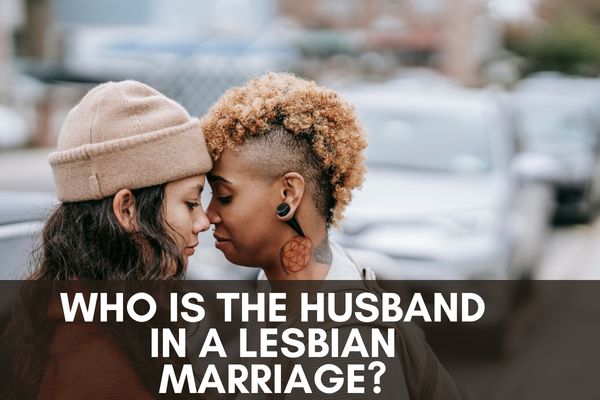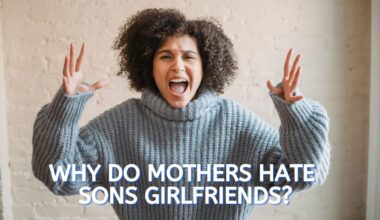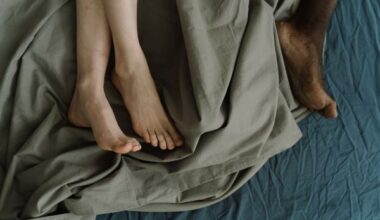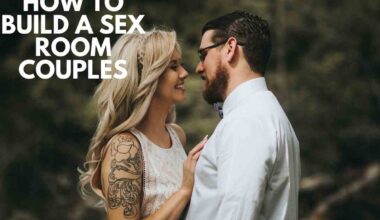In lesbian marriage, people get confused about who to address as the husband in the union. Hence the question, “Who is the husband in a lesbian marriage?”
This article will tell you if there are husbands in lesbian marriages or not.
First of all, who is a lesbian? A lesbian is a female homosexual. Regardless of sexual orientation, the term is also used to describe or link nouns with female homosexuality or same-sex attraction when used to women and their sexual identity or sexual activity.
Who Is The Husband In A Lesbian Marriage?
What do lesbians think of the word “wife”? Do you refer to your partner as your “wife”? Several lesbians are having trouble deciding what to call their partners now that same-sex marriage is permitted in many jurisdictions.
Some women are comfortable using the term “wife,” while others find it offensive and detest it because it conjures up images of patriarchy, male ownership of women, and female slavery.
But, some women are choosing to “take back” the term “wife,” just like they have done with other words that have offended our community. Similar to how some women have reclaimed the term “dyke,”
Some people say, quite often, but not always, one looks decidedly more dominant than the other, so it is pretty apparent which one is the “man” in their relationship.
Some claim that just as everyone has a masculine and feminine side and a dominating and submissive side to their nature, everything balances out and evens out, just like how electromagnetic has positive and negative attraction and repulsion.
However, Lesbian couples can devote their energy more effectively by letting the partner who naturally gravitates towards a position fill that function while also making it easier for them to balance tasks because neither can use the excuse that “that’s women’s labor” or “that’s a man’s job!”
If it seems that one partner has more “masculine” interests and the other more “feminine,” it’s actually because the majority of our ideas about what makes something “masculine” or “feminine” really have little to do with biological sex; instead, they are convenient “packages” of ideas about behavior, appearance, and expectations, that have solidified around cultural expressions of natural urges, historically built around justifications of hierarchical, etc.
We are all shaped by evolution from a long series of sexually reproduced organisms, regardless of how any particular person feels (or does not feel) about their sex or gender roles.
As there is no either/or choice, people tend to vary on a scale of “masculine” or “feminine,” and they also tend to lean towards particular preferences that are expressed following societal norms. The problem is that humans have developed to the point where our ability to survive depends more on how we interact with others than on how swiftly we can run or reproduce.
Because men, women, and intersex persons share many skills in standard, inflexible rules about who can do what based only on their sexual orientation unnecessarily prevent people from spontaneously grouping themselves following talent and affinity.
Parents have a lot of freedom to choose what interests them and the behaviors they wish to model for their children when expectations based on sex or gender roles are negated, such as when a person identifies as lesbian.
It shows that all those behaviors are simply things people do when inclined to do them. Children are well served by parents who contribute by following their preferences and abilities, not antiquated presumptions. Then the kids might get two moms who run an art welding studio, quilt blankets for them, and coach their basketball.
When A Gay Couple Marries, Does The Priest Say, “I Now Pronounce You Wife And Wife”?
Depending on what the couple wants, Few of them want to be pronounced as “wife and wife” or “husband and husband,” even if they already use those pronouns to refer to one another in “real” life.
You can declare, “I now pronounce you married under the laws of..” or “I now pronounce you married partners in heart and mind, body and spirit, love and life.”
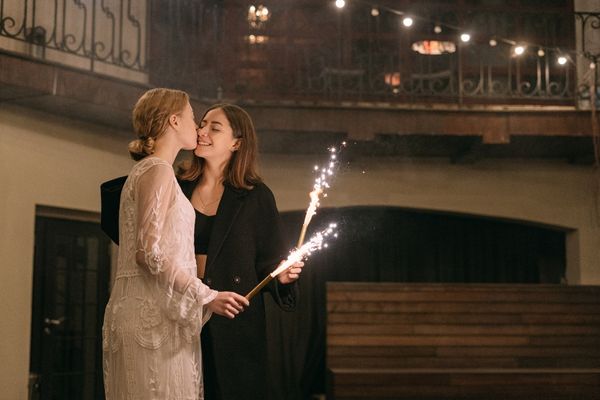
How Do Lesbians Feel About The Word “Lesbian?”
The American Psychological Association has been urging psychologists to lead the charge in eradicating the stigma of mental illness that has long been connected to homosexual, gay, and bisexual orientations—this call to action dates back to 1975.
The field of psychology is concerned with the security of individuals and groups, as well as the dangers to that security. Lesbian, homosexual, and bisexual people frequently face prejudice and discrimination, which has been demonstrated to have a negative psychological impact.
Many lesbians who dislike the name “lesbian” look up to JoJo Siwa. JoJo stated, “I don’t like the word [lesbian] itself,” just a lot in an interview with Yahoo.
JoJo understands that a lesbian is a female homosexual but dreads being referred to as one. That’s who I am at the end of the day. Similar to the word moist, said, it’s… awful!
JoJo doesn’t mind being homosexual; she likes the label “gay.” She added, “If the world would’ve worked out for me to come out sooner, then I certainly would’ve, but I never felt the need to,” when speaking about coming out. I didn’t even recognize I was gay until I came to terms with it. I doubt I would make any changes if I could go back in time.
Even though she prefers to be called “gay” rather than the more precise “lesbian,” JoJo sees herself as living truthfully to who she is. She declares, “I am unapologetic about who I am, who I love, what I think, and what I feel. “I’m only recently realizing that I don’t require other people’s approval to cut my hair or to love who I want. I need my approval, which can occasionally be challenging to obtain.
We believe that individuals and societies respect the wishes of people who don’t want to be called lesbians. It is what they want that you have to do because they are also humans.
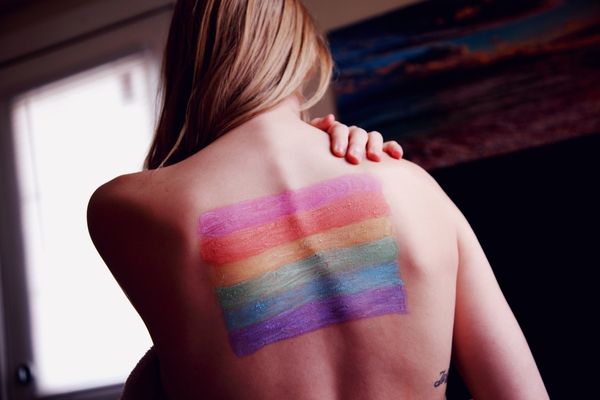
What Is The Difference Between Gay And Lesbian?
Gay is an adjective used to describe persons attracted to other members of the same gender on a physical, romantic, emotional, and spiritual level. Historically, males attracted to men were expressly referred to as “gay.”
Anyone attracted to their gender can now use the term “gay” to describe themselves. It’s entirely up to you which word best describes who you are.
Women who are attracted to other women are primarily referred to as lesbians. Moreover, it functions as an adjective. Some lesbians want to be identified as “gay,” and that’s okay.
Is Homosexuality A Mental Disorder?
Being LGBTI (lesbian, gay, bisexual, transgender, or intersex) is entirely compatible with leading an everyday, healthy life, according to a significant body of scientific research. Clinical research demonstrates the validity of same-sex sexual and romantic desire, feelings, and behavior.
Human sexuality comes in a variety of acceptable forms.
The “International Classification of Diseases” is a list of illnesses the WHO (ICD) maintains. The most recent medical research is taken into consideration when updating this list.
The ICD-9 still classified homosexuality as an illness in 1977. The WHO later took the item off the list, though. In May 1990, the 43rd World Health Assembly approved that choice. Hence, it is stated explicitly in the currently used ICD-10 that “sexual orientation by itself is not to be regarded as an illness.”
The sexual orientations of lesbian, gay, and bisexual people are not pathologies. No sexual orientation has been demonstrated to be inherently linked to psychopathology by research.
Human sexuality includes both heterosexual and gay activity as standard elements, and both have been recorded across a wide range of cultures and historical periods.
All mainstream medical and mental health organizations in this country have concluded that lesbian, gay, and bisexual orientations are standard forms of human experience, even though stereotypes persist that portray lesbian, gay, and bisexual people as disturbed.
This is the result of decades of research and clinical experience. Bisexual, lesbian, and homosexual partnerships are joint for people to connect.
Because of this, these mainstream organizations gave up classifying homosexuality as a mental condition a long time ago.
Conclusion
Is there a husband in a lesbian marriage? Because it conjures up thoughts of patriarchy, male ownership of women, and female enslavement, some women feel comfortable using the term “wife,” while others find it offensive and loathe it.
Also, some gay women don’t like to use the ‘lesbian.’ Many lesbians dislike the name.
They prefer being called gay, and society should respect their choices. It would be best to address them as they like being addressed. Also, priests may call them wife and wife or partners during weddings, and either of the both is still valid because that is what the couple wants.
Lastly, being gay is not a mental disorder, and heterosexual and homosexual behavior is accepted as everyday aspects of human sexuality.
We hold that society and individuals should respect the wishes of those who reject the label of lesbian. Because they are also humans, you must comply with their wishes.


